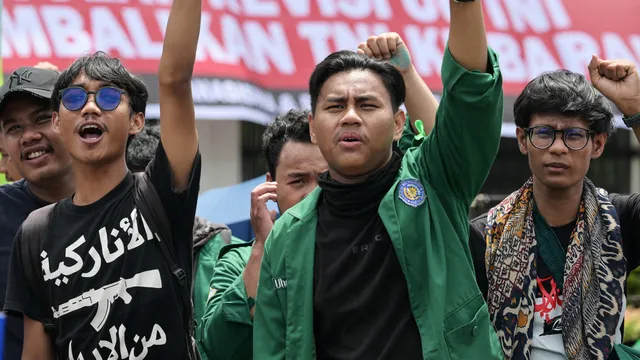
Indonesia's Parliament expands military's civilian role amid rising protests
2025-03-21 07:12- Indonesia's Parliament unanimously approved a revision to military law that expands the military's role in civilian affairs.
- Human rights groups warn that this law revives the military's past dominance in governance, which could threaten the country's democracy.
- Growing opposition is expected as activists rally against the new law, calling for accountability and civil rights protection.
Express your sentiment!
Insights
On March 20, 2025, Indonesia's Parliament passed a revision of its military law that has raised substantial concerns among human rights activists and pro-democracy groups. This decision was finalized during a plenary session and received unanimous support from all eight political parties represented in Parliament, many of which are aligned with President Prabowo Subianto. Currently, active military officers can only hold positions in ministries or agencies related to security, defense, or intelligence; however, this new law allows military personnel to serve in additional civilian roles in sectors such as the Attorney General’s Office and the Supreme Court without the need to resign from the military. The amendment to the law has been criticized for potentially undermining democratic processes that have been established since the fall of the Suharto regime in 1998. Observers have voiced fear that the expansion of military involvement in civilian affairs mirrors past authoritarian practices, reminiscent of Suharto’s era when the military assumed significant control over governance. The swift and secretive manner in which the law was deliberated and passed, without sufficient public engagement, further exacerbates these concerns. Proponents of the law argue that it is necessary for addressing modern geopolitical challenges, but critics warn that it may reignite a period of military dominance and jeopardize individual rights. Human rights organizations have raised alarms over the implications of assigning military officers to civilian roles, suggesting that it could lead to abuses of power, increased violence against civilians, and a regression in democratic governance. Activists have organized protests outside Parliament in anticipation of the law's passage, gathering the support of various student organizations advocating for a stronger democratic framework. As the government defends the reforms as crucial for national security, civil society is deeply divided over their potential consequences for Indonesia's democratic future. This legislative change marks a significant shift in the balance of power in Indonesia, as military influence in civilian government could challenge the foundations of democracy. Further monitoring and activism from civil society are expected as Indonesians grapple with the implications of this revised law on their everyday lives and governance.
Contexts
The history of military influence in the Indonesian government is deeply intertwined with the nation's political landscape, dating back to the early years of independence. Following the Dutch colonial period, Indonesia achieved independence in 1945 and faced numerous internal challenges, including regional rebellions and a lack of political stability. The military emerged as a key player during this time, positioning itself as a stabilizing force and protector of the nation. General Abdul Haris Nasution, a prominent figure in the military, laid the groundwork for the role of the armed forces in politics. The concept of "dual function" (dwifungsi) was articulated, which justified the military's involvement not only in defense but also in governance and development, asserting that the military was essential to national integrity and unity. In the 1960s, the influence of the military surged as Indonesia grappled with political turmoil and economic crisis. The Indonesian Communist Party (PKI) grew in prominence, leading to heightened tensions between leftist groups and the military. The situation culminated in a coup attempt in 1965, which was blamed on the PKI. This event marked a significant turning point as General Suharto, who was then a major general, consolidated power by orchestrating a violent anti-communist purge that resulted in the deaths of hundreds of thousands. Suharto's regime, which lasted from 1967 until 1998, was characterized by a military-dominated government that utilized the dual function philosophy to maintain control. The military held crucial positions in the cabinet and various governmental bodies, blurring the lines between military and civilian authority. Throughout Suharto's New Order regime, the military's influence perpetuated a culture of authoritarianism, with widespread human rights abuses and suppression of dissent. The military not only controlled political power but also played a significant role in economic development by establishing business enterprises. This intertwining of military and economic interests created networks of patronage that further entrenched military power in the political sphere. The rise of civil society and increasing demands for reform during the late 1990s led to a significant shift. After Suharto's resignation in 1998, Indonesia entered a period of political reform, commonly referred to as the Reformation Era, which sought to reduce military influence in governance. The post-Suharto era has seen a gradual demilitarization of Indonesian politics, with reforms aimed at strengthening democratic institutions and civil society. Although the military remains influential, particularly in remote regions where it is seen as a provider of security and stability, its direct political power has diminished significantly. In contemporary Indonesia, the military's role is largely confined to defense, with a constitutional framework that restricts active military involvement in government. However, the legacy of military influence persists, as the military continues to play a notable role in domestic politics, and former military officers maintain influential positions within the political landscape. Thus, while significant progress has been made in establishing a democratic society, the historical imprint of military authority in Indonesia's governance remains a pivotal aspect of its political development.